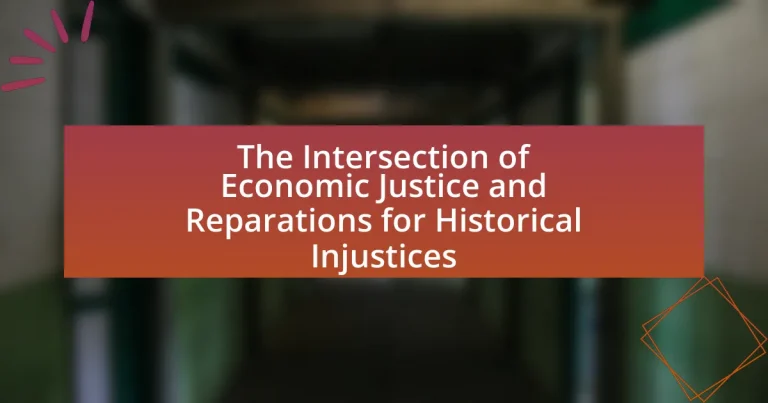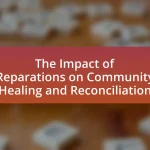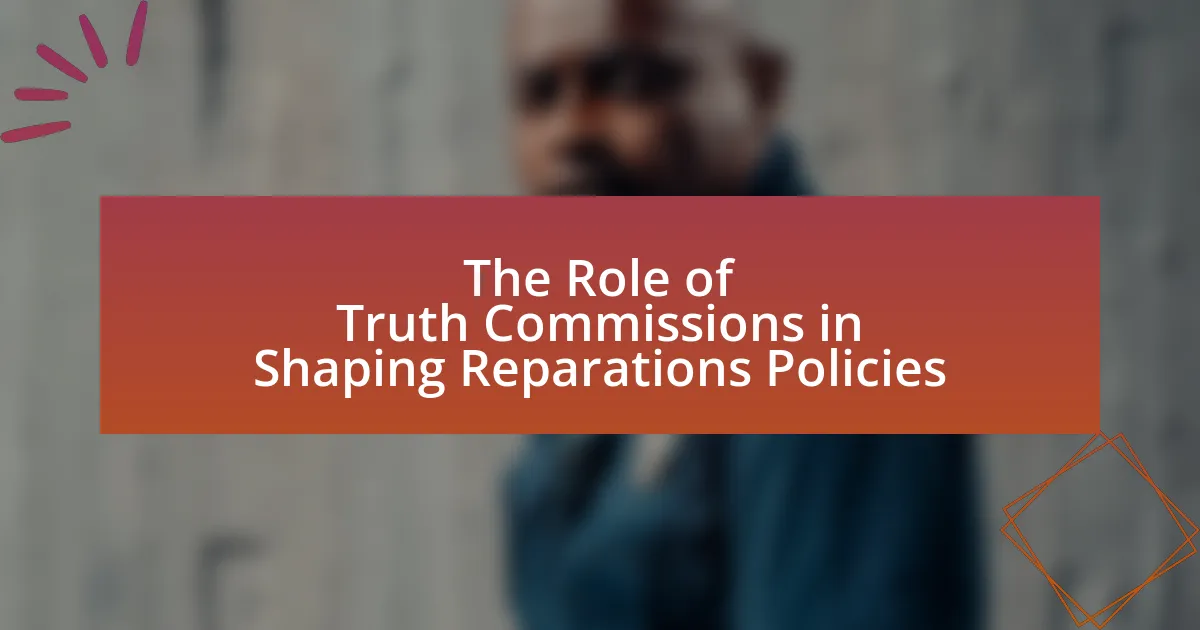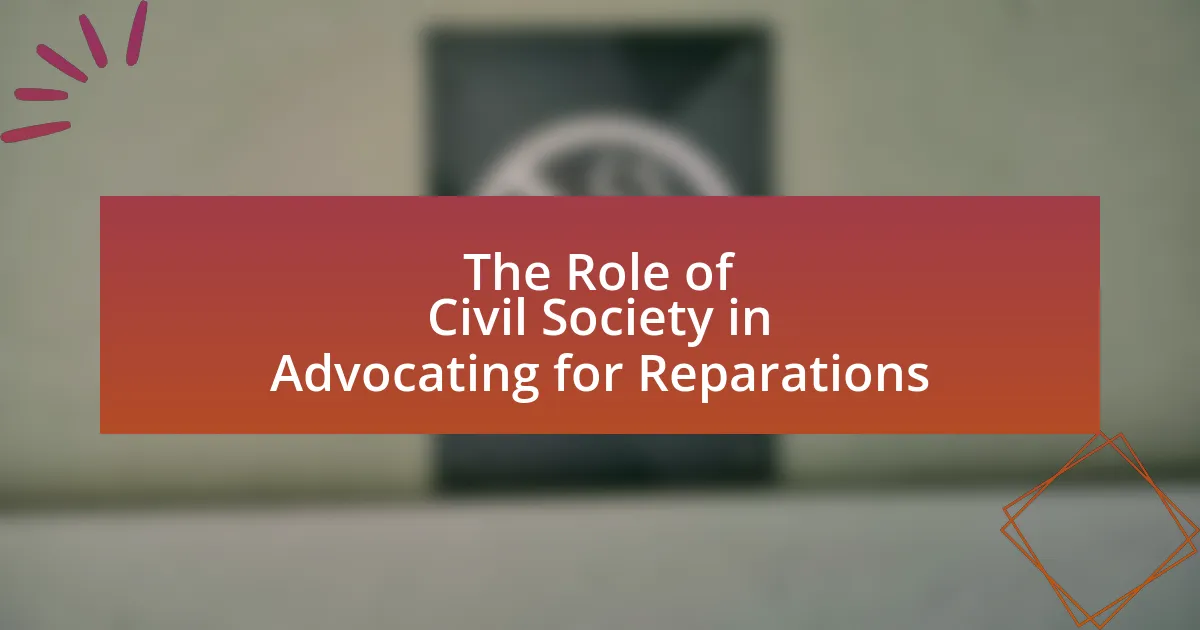The article examines the intersection of economic justice and reparations for historical injustices, emphasizing the need for financial redress to address systemic inequalities rooted in past wrongs such as slavery and colonialism. It discusses how economic justice advocates for equitable resource distribution while reparations aim to compensate marginalized groups for historical harms, particularly highlighting the wealth disparities faced by African Americans. The article also explores the historical contexts necessitating reparations, the moral and ethical arguments supporting them, and the various forms and models of reparations proposed. Additionally, it addresses the challenges in implementing reparations, including legal, political, and social obstacles, and outlines potential outcomes of successful reparations initiatives in promoting economic equity and social cohesion.
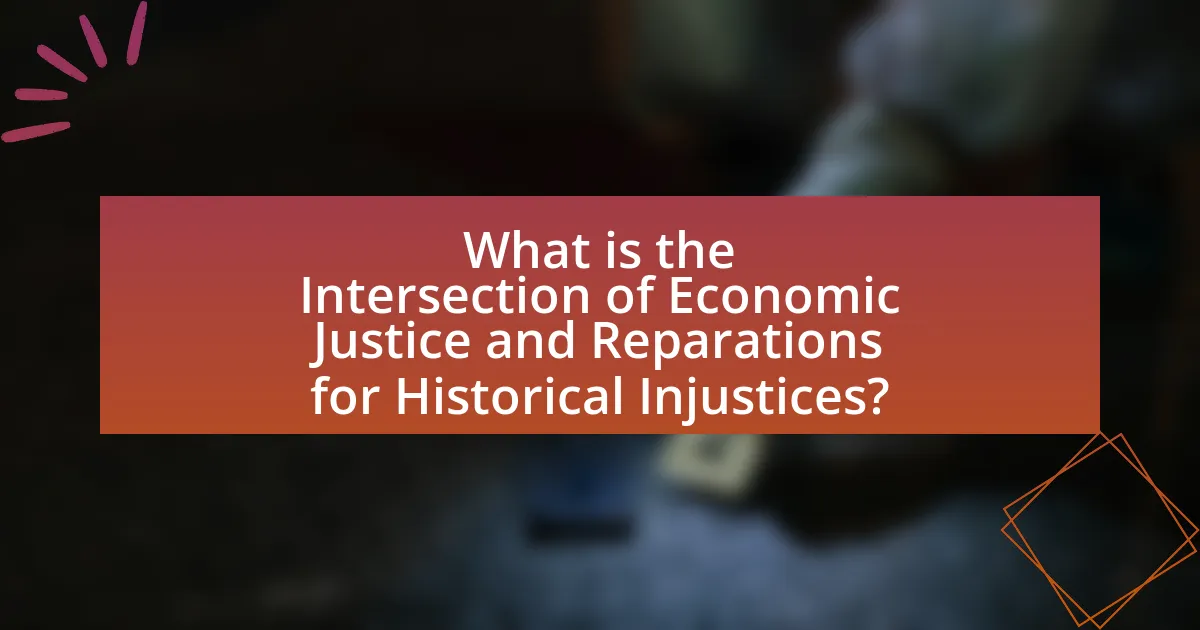
What is the Intersection of Economic Justice and Reparations for Historical Injustices?
The intersection of economic justice and reparations for historical injustices lies in the recognition that systemic inequalities, rooted in past injustices, necessitate financial redress to achieve equitable economic outcomes. Economic justice advocates for fair distribution of resources and opportunities, while reparations aim to compensate marginalized groups for historical wrongs, such as slavery and colonialism. For instance, the U.S. government’s reparations discussions for African Americans highlight the need to address wealth disparities that stem from centuries of discrimination, evidenced by studies showing that Black households possess significantly less wealth than white households, with a median net worth of $24,100 compared to $188,200 in 2019. This financial disparity underscores the necessity of reparations as a means to promote economic justice and rectify historical grievances.
How do economic justice and reparations relate to each other?
Economic justice and reparations are interconnected concepts that address the financial and social consequences of historical injustices. Economic justice seeks to rectify systemic inequalities by ensuring equitable access to resources, opportunities, and wealth distribution, while reparations specifically aim to compensate individuals or communities harmed by past injustices, such as slavery or colonialism. For instance, the U.S. government’s consideration of reparations for African Americans is rooted in the economic disparities created by slavery and segregation, highlighting the need for economic justice as a means to address these historical wrongs. Thus, reparations can be viewed as a practical application of economic justice, aiming to restore balance and equity to those affected by historical injustices.
What are the historical contexts that necessitate reparations?
Reparations are necessitated by historical contexts of systemic injustices, including slavery, colonialism, and discriminatory policies that have caused long-lasting economic and social disparities. For instance, the transatlantic slave trade forcibly displaced millions of Africans, leading to generational wealth gaps that persist today, as evidenced by studies showing that Black Americans have significantly lower median wealth compared to white Americans. Additionally, the effects of colonial exploitation in regions such as Africa and the Caribbean have resulted in economic underdevelopment and resource depletion, further justifying reparative measures. Historical policies like redlining in the United States systematically denied Black families access to home ownership and wealth accumulation, reinforcing the need for reparations to address these entrenched inequalities.
How does economic justice inform the reparations debate?
Economic justice significantly informs the reparations debate by emphasizing the need to address historical inequalities and systemic injustices that have economically disadvantaged specific groups, particularly marginalized communities. This perspective argues that reparations are not merely compensatory payments but a necessary step toward rectifying the economic disparities created by slavery, colonialism, and discriminatory policies. For instance, studies indicate that African American families, on average, possess a net worth that is significantly lower than that of white families, a disparity rooted in historical injustices such as redlining and discriminatory labor practices. By framing reparations within the context of economic justice, advocates highlight the importance of equitable access to resources, opportunities, and wealth-building mechanisms as essential components of a just society.
Why is the concept of reparations significant in discussions of economic justice?
The concept of reparations is significant in discussions of economic justice because it addresses the historical and systemic inequalities that have disadvantaged specific groups, particularly marginalized communities. Reparations aim to rectify the economic disparities created by past injustices, such as slavery, colonization, and discriminatory policies, by providing financial compensation or resources to affected individuals or communities. For instance, studies show that African Americans have faced a wealth gap, with their median net worth being significantly lower than that of white Americans, largely due to historical injustices. This financial disparity underscores the need for reparations as a means to promote equity and justice in economic systems.
What moral and ethical arguments support reparations?
Moral and ethical arguments supporting reparations include the principles of justice, accountability, and rectification of historical wrongs. Justice demands that societies acknowledge and address the harms inflicted on marginalized groups, particularly those affected by slavery, colonialism, and systemic discrimination. Accountability emphasizes the responsibility of current generations to rectify the injustices perpetrated by their predecessors, as seen in the historical context of the United States, where slavery and segregation have lasting impacts on African American communities. Rectification involves compensating for the economic and social disadvantages that have resulted from these injustices, as evidenced by studies showing significant wealth disparities between racial groups, such as the 2019 Federal Reserve report indicating that the median wealth of white families is ten times greater than that of Black families. These arguments collectively advocate for reparations as a means to achieve economic justice and heal societal divisions.
How do reparations address systemic inequalities?
Reparations address systemic inequalities by providing financial compensation and resources to historically marginalized communities, thereby aiming to rectify the economic disparities created by past injustices. This financial support can help alleviate poverty, improve access to education, and enhance economic opportunities for affected groups. For instance, studies have shown that African American households have significantly lower wealth compared to white households, with a median wealth of $24,100 versus $188,200 in 2019, highlighting the need for reparative measures to bridge this gap. By redistributing wealth and resources, reparations can contribute to dismantling the structural barriers that perpetuate inequality, fostering a more equitable society.
What are the different forms of reparations proposed?
Different forms of reparations proposed include financial compensation, land restitution, educational scholarships, and community investment. Financial compensation aims to provide direct monetary payments to affected individuals or communities, while land restitution seeks to return land to those dispossessed due to historical injustices. Educational scholarships are designed to enhance access to education for marginalized groups, and community investment focuses on funding infrastructure and services in historically disadvantaged areas. These proposals are grounded in the recognition of historical wrongs and aim to address systemic inequalities.
What financial reparations models exist?
Financial reparations models include direct cash payments, land restitution, tax credits, and investment in community programs. Direct cash payments provide monetary compensation to affected individuals or communities, as seen in the case of Japanese American internment reparations in the 1980s, where the U.S. government paid $20,000 to each survivor. Land restitution involves returning land to indigenous peoples or communities displaced by colonialism or other injustices, exemplified by land reforms in South Africa post-apartheid. Tax credits can offer financial relief to marginalized groups, such as the Earned Income Tax Credit in the U.S., which supports low-income families. Lastly, investment in community programs focuses on long-term development, like the reparations initiatives in Chicago aimed at addressing historical injustices against African Americans through funding for education and housing. Each model aims to address historical injustices and promote economic equity.
How do non-financial reparations contribute to economic justice?
Non-financial reparations contribute to economic justice by addressing systemic inequalities and fostering social equity. These reparations can include measures such as land restitution, educational opportunities, and community investments, which directly empower marginalized groups. For instance, land restitution can restore property rights to communities historically dispossessed, thereby enabling economic self-sufficiency and wealth accumulation. Educational initiatives can provide access to quality schooling, which is essential for breaking the cycle of poverty and enhancing economic mobility. Research indicates that communities receiving such reparative measures experience improved economic outcomes, as seen in studies highlighting the positive impact of educational access on income levels. Thus, non-financial reparations play a crucial role in rectifying historical injustices and promoting long-term economic justice.
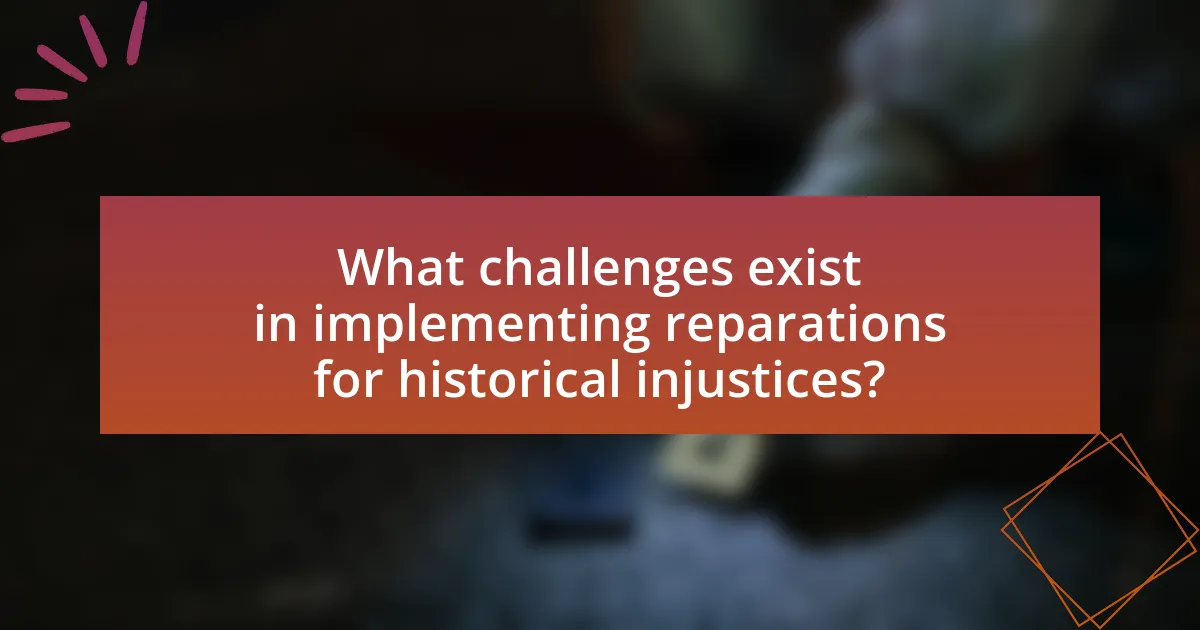
What challenges exist in implementing reparations for historical injustices?
Implementing reparations for historical injustices faces several significant challenges, including legal, political, and social obstacles. Legal challenges arise from the difficulty in establishing a clear framework for reparations, as laws may not adequately address historical grievances or provide a basis for compensation. Politically, there is often a lack of consensus among lawmakers and the public regarding the necessity and form of reparations, leading to stalled initiatives. Socially, there can be resistance from groups who may feel threatened by the redistribution of resources or who deny the historical injustices that necessitate reparations. These challenges are compounded by the complexity of identifying beneficiaries and determining appropriate compensation, as seen in various historical contexts, such as the reparations discussions related to slavery in the United States or the Holocaust in Europe.
What are the main obstacles to achieving economic justice through reparations?
The main obstacles to achieving economic justice through reparations include political resistance, legal challenges, and societal divisions. Political resistance arises from a lack of consensus among lawmakers and the public regarding the necessity and implementation of reparations, often fueled by differing views on historical accountability. Legal challenges stem from the complexities of establishing claims and determining beneficiaries, as seen in cases like the reparations discussions for African Americans, where courts have historically been reluctant to grant such claims. Societal divisions manifest in differing opinions on the moral and economic implications of reparations, leading to polarized debates that hinder progress. These factors collectively impede the establishment of a framework for reparations that could effectively address historical injustices and promote economic justice.
How do political and social resistance impact reparations efforts?
Political and social resistance significantly hinders reparations efforts by creating obstacles in policy implementation and public support. For instance, political opposition often arises from parties or individuals who view reparations as divisive or unjust, leading to legislative gridlock. Social resistance manifests through public sentiment, where segments of the population may oppose reparations due to misconceptions about their purpose or perceived unfairness. Historical examples, such as the resistance faced by the 1989 Civil Liberties Act, which provided reparations to Japanese Americans interned during World War II, illustrate how both political and social pushback can delay or dilute reparative measures. This resistance ultimately affects the scope, funding, and effectiveness of reparations initiatives, making it challenging to achieve meaningful economic justice for affected communities.
What legal challenges arise in the pursuit of reparations?
Legal challenges in the pursuit of reparations include proving causation, establishing legal standing, and navigating statutes of limitations. Claimants must demonstrate a direct link between historical injustices and current harm, which can be complex due to the passage of time and lack of documentation. Additionally, potential plaintiffs may face difficulties in meeting legal standing requirements, as courts often require individuals to show they have been directly harmed. Statutes of limitations can further complicate cases, as many claims may be barred if they are not filed within a specific timeframe. These challenges are evident in various reparations discussions, such as those related to slavery in the United States, where courts have historically dismissed cases on these grounds.
How can public opinion influence the reparations movement?
Public opinion can significantly influence the reparations movement by shaping political agendas and public policy. When a substantial portion of the population supports reparations, it can lead to increased political pressure on lawmakers to introduce legislation or initiatives aimed at addressing historical injustices. For instance, surveys indicate that as public awareness of systemic racism and its impacts grows, support for reparations has also increased, with a 2021 poll showing that 61% of Americans believe that Black Americans should receive financial compensation for slavery. This shift in public sentiment can mobilize advocacy groups, attract media attention, and ultimately result in legislative action, as seen in various local and state-level reparations discussions across the United States.
What role does education play in shaping perceptions of reparations?
Education plays a crucial role in shaping perceptions of reparations by informing individuals about historical injustices and their ongoing impacts. Through curricula that include comprehensive discussions on topics such as slavery, colonialism, and systemic racism, education fosters awareness and understanding of the need for reparative measures. Studies, such as those conducted by the American Educational Research Association, indicate that students exposed to inclusive historical narratives are more likely to support reparations as a form of justice. This educational foundation helps individuals recognize the socio-economic disparities rooted in historical injustices, thereby influencing public opinion and policy discussions surrounding reparations.
How can advocacy efforts effectively mobilize support for reparations?
Advocacy efforts can effectively mobilize support for reparations by raising public awareness, building coalitions, and leveraging data to demonstrate the need for reparative justice. Public awareness campaigns educate communities about the historical injustices that necessitate reparations, such as slavery and systemic discrimination, which have lasting economic impacts. Building coalitions with diverse groups, including civil rights organizations, economic justice advocates, and affected communities, amplifies voices and creates a unified front. Additionally, utilizing data and research, such as the economic disparities highlighted in the 2020 report by the Institute for Policy Studies, which shows that the median wealth of white families is ten times that of Black families, provides concrete evidence of the ongoing effects of historical injustices, thereby strengthening the case for reparations.
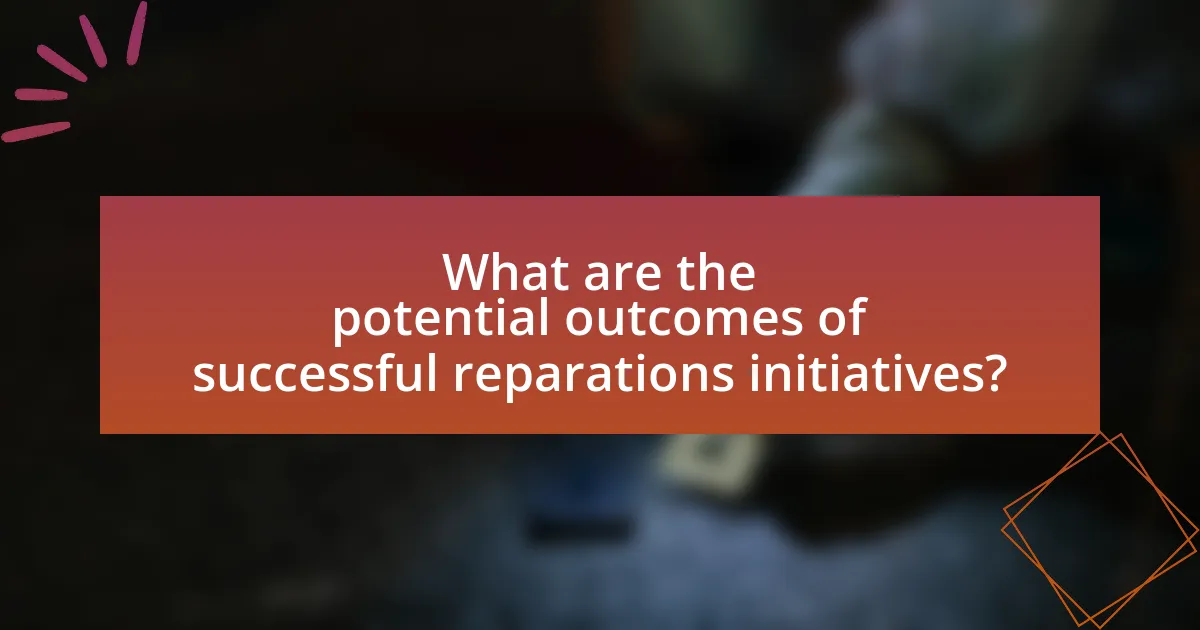
What are the potential outcomes of successful reparations initiatives?
Successful reparations initiatives can lead to significant economic empowerment and social equity for historically marginalized communities. These initiatives often provide financial compensation, which can reduce wealth gaps and improve access to education, healthcare, and housing. For instance, studies have shown that reparations can enhance community investment and stimulate local economies, as seen in programs implemented in various countries addressing historical injustices. Furthermore, successful reparations can foster reconciliation and healing, contributing to social cohesion and reducing systemic inequalities. Historical examples, such as the reparations paid to Japanese Americans interned during World War II, demonstrate that such initiatives can lead to acknowledgment of past wrongs and promote a more equitable society.
How could reparations reshape economic landscapes for affected communities?
Reparations could significantly reshape economic landscapes for affected communities by providing financial resources that enable investment in education, housing, and business development. For instance, studies indicate that reparations can lead to increased wealth accumulation, as seen in the case of the 40 acres and a mule promise to formerly enslaved individuals, which aimed to provide economic independence. Historical data shows that communities receiving reparations often experience improved economic stability and growth, as evidenced by the reparations paid to Japanese Americans interned during World War II, which helped facilitate their reintegration and economic recovery. By addressing historical injustices, reparations can foster long-term economic empowerment and reduce systemic inequalities.
What long-term benefits could arise from reparations in terms of economic equity?
Reparations can lead to significant long-term benefits in economic equity by addressing systemic inequalities and providing financial resources to historically marginalized communities. By redistributing wealth, reparations can enhance access to education, healthcare, and housing, which are critical for economic mobility. For instance, studies indicate that targeted financial support can reduce poverty rates and increase homeownership among affected populations, fostering generational wealth. Additionally, reparations can stimulate local economies by increasing consumer spending within these communities, ultimately contributing to broader economic growth. Historical examples, such as the reparations paid to Japanese Americans after World War II, demonstrate that such measures can lead to improved economic outcomes and social cohesion over time.
How might reparations contribute to social cohesion and healing?
Reparations can contribute to social cohesion and healing by addressing historical injustices and fostering a sense of acknowledgment and accountability. When reparations are implemented, they provide financial compensation or resources to marginalized communities, which can help rectify economic disparities rooted in systemic discrimination. For instance, studies have shown that reparative measures can lead to improved economic conditions for affected groups, thereby reducing inequality and promoting social stability. Additionally, reparations can facilitate dialogue and reconciliation between communities, as they often involve public acknowledgment of past wrongs, which is essential for healing collective trauma. This process can strengthen relationships among diverse groups, ultimately enhancing social cohesion.
What lessons can be learned from historical reparations efforts worldwide?
Historical reparations efforts worldwide demonstrate that successful reparations require clear acknowledgment of past injustices, a commitment to restorative justice, and the involvement of affected communities in the decision-making process. For instance, Germany’s reparations to Holocaust survivors involved direct payments and social services, which helped rebuild trust and support for the Jewish community. Additionally, the U.S. government’s reparations to Japanese Americans interned during World War II included monetary compensation and a formal apology, highlighting the importance of recognition and accountability. These examples illustrate that reparations can foster healing and reconciliation when they are comprehensive, transparent, and inclusive, ultimately contributing to broader economic justice.
What successful examples of reparations can inform current initiatives?
Successful examples of reparations that can inform current initiatives include the reparations paid to Japanese Americans interned during World War II and the reparations program in Germany for Holocaust survivors. The U.S. government provided $20,000 to each surviving Japanese American internee through the Civil Liberties Act of 1988, acknowledging the injustice and offering a form of restitution. In Germany, the Federal Republic has paid over $70 billion in reparations to Holocaust survivors since the 1950s, recognizing the atrocities committed and providing financial support to victims. These historical precedents demonstrate the potential for reparations to address past injustices and offer a framework for current initiatives aimed at economic justice.
How have different countries approached the issue of reparations?
Different countries have approached the issue of reparations through various methods, often influenced by their historical contexts and social dynamics. For instance, Germany has provided reparations to Holocaust survivors and their descendants, amounting to over 70 billion euros since the 1950s, reflecting a formal acknowledgment of its past atrocities. In contrast, the United States has seen movements advocating for reparations for African Americans, with proposals ranging from direct payments to investments in community programs, although no federal legislation has been enacted. South Africa’s Truth and Reconciliation Commission offered reparations to victims of apartheid, focusing on restorative justice rather than financial compensation alone. These examples illustrate the diverse strategies nations employ to address historical injustices, balancing moral responsibility with practical implementation.
What practical steps can be taken to advocate for reparations today?
To advocate for reparations today, individuals and organizations can engage in grassroots mobilization, legislative advocacy, and public education campaigns. Grassroots mobilization involves organizing community events, rallies, and discussions to raise awareness about the need for reparations, as seen in movements like the National African American Reparations Commission. Legislative advocacy includes lobbying local, state, and federal lawmakers to introduce and support reparations bills, such as H.R. 40, which seeks to establish a commission to study and develop reparations proposals for African Americans. Public education campaigns can utilize social media, workshops, and informational resources to inform the public about the historical injustices and economic disparities that necessitate reparations, drawing on studies that highlight the wealth gap between Black and white Americans, which is approximately $154,000 according to the Federal Reserve. These steps collectively create a comprehensive approach to advocating for reparations in contemporary society.
How can individuals and organizations effectively support reparations initiatives?
Individuals and organizations can effectively support reparations initiatives by advocating for policy changes, providing financial contributions, and engaging in community education. Advocacy for policy changes involves lobbying for legislation that addresses historical injustices, such as the introduction of reparations bills, which have been proposed in various jurisdictions, including the U.S. Congress. Financial contributions can be directed towards organizations that focus on reparative justice, such as the Movement for Black Lives, which works to address systemic inequalities. Additionally, engaging in community education helps raise awareness about the historical context and necessity of reparations, fostering a more informed public discourse. Research indicates that public support for reparations can increase when individuals understand the historical injustices faced by marginalized communities, as highlighted in studies by the Pew Research Center.
What strategies can be employed to raise awareness about economic justice and reparations?
To raise awareness about economic justice and reparations, strategies such as educational campaigns, community engagement, and policy advocacy can be employed. Educational campaigns can include workshops, seminars, and online resources that inform the public about the historical context and current implications of economic injustices, supported by research from institutions like the Institute for Policy Studies, which highlights the wealth gap resulting from systemic discrimination. Community engagement can involve partnerships with local organizations to host events that foster dialogue and understanding, as seen in initiatives like the National African American Reparations Commission, which promotes grassroots involvement. Policy advocacy can focus on lobbying for legislative changes that address economic disparities, evidenced by movements that have successfully influenced reparative policies in various jurisdictions.
